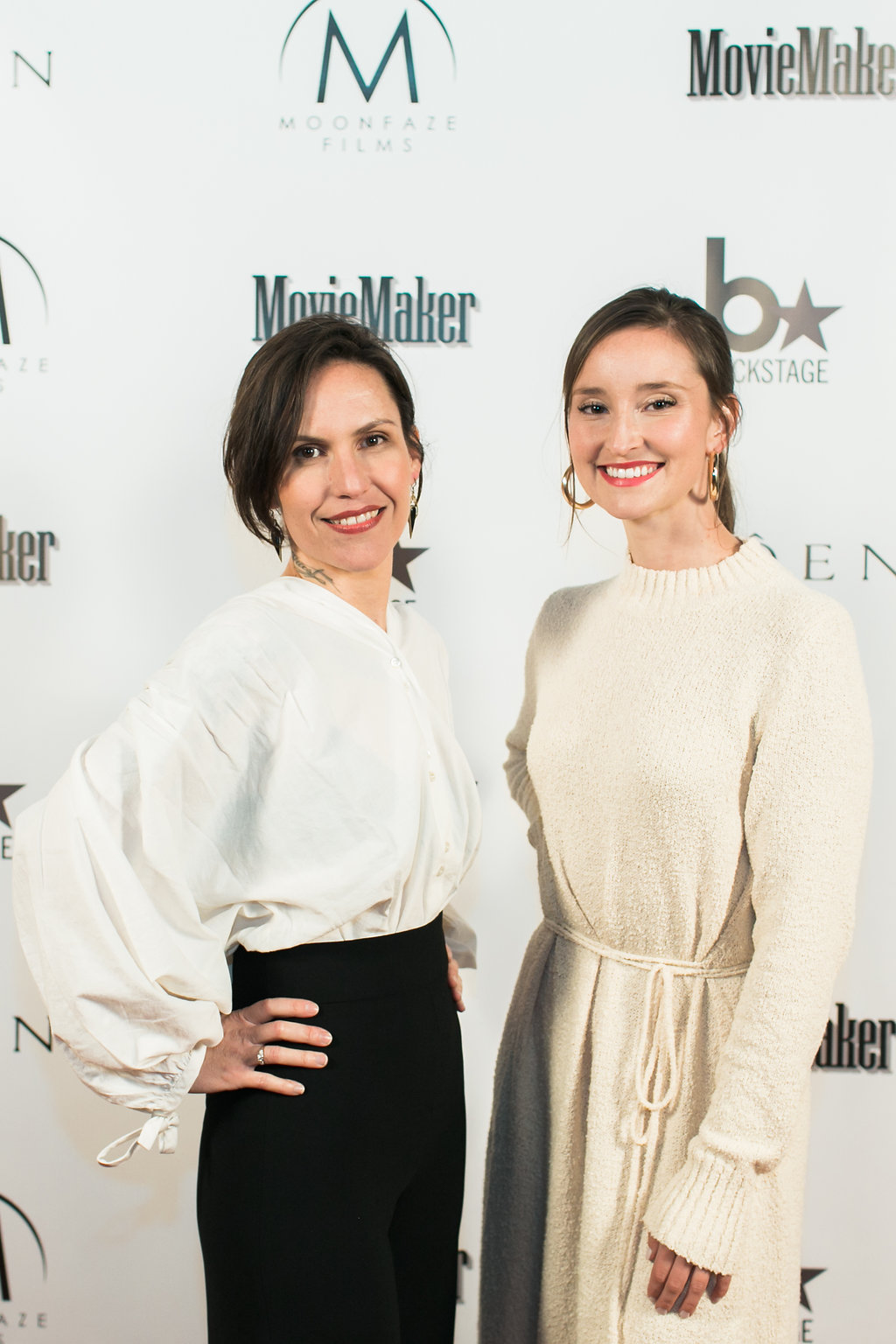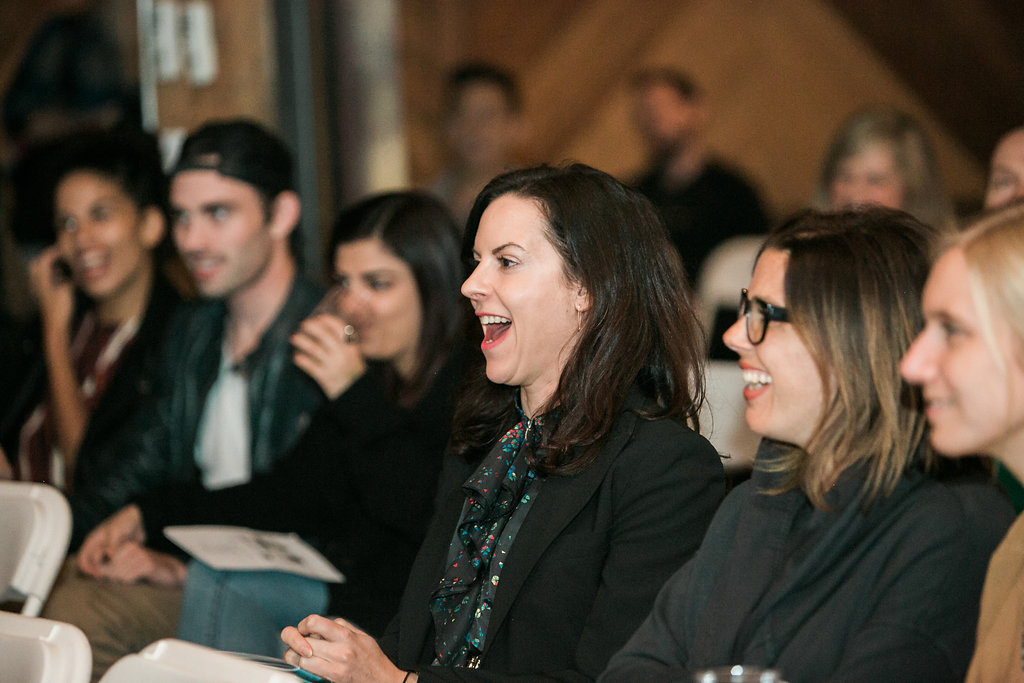
Premstar Santana (l) and Roxanne Morrison (r) [Photo credit: Nico Nelson]
While this fact isn’t news to anyone, it has increasingly been brought to the forefront of our nation’s social consciousness in the past few years. Prominent actresses like Jennifer Lawrence, Julia Louis-Dreyfus, and Patricia Arquette have used their platforms to draw attention to the wage gap that exists in the film industry between actresses and actors, and people of color in the acting community, like Asian American actors Aziz Ansari and Constance Wu, have called for more representation of minorities both in front of the camera and behind it. Still, despite the increased number of conversations we’ve been having, both on national and personal levels, the industry hasn’t made any wide-sweeping changes to address these imbalances. People are talking, and Hollywood, for the most part, has yet to let on that it’s listening.
That’s why it’s always better to resort to action when words just don’t seem to cut it. Moonfaze Feminist Film Festival, which took place for the second year this past December 1st, isn’t just a call for a more inclusive film industry, it’s a concrete step in that direction. Spearheaded by Premstar Santana and Roxanne Morrison, both actresses themselves, the event featured 19 short entries that ran the gamut when it came to style and genre — from drama, documentary, and experimental to music videos and web series.
When asked how the duo decided on which films to include in the festival, Prem (as she goes by) said that their “number-one criteria was excellence. Quality of films. They didn’t have to be directed by a woman, as long as they were female-driven films with a feminist viewpoint.” Those two points — excellence and being female-driven — were definitely met by all the entries shown that evening. Opening with a drama that focused on a black American woman’s harrowing encounter with racism and misogyny in Africa (In Their Eyes), and closing with a gender-bending Bowie-inspired music video starring Westworld‘s Evan Rachel Wood (Oh Yeah), the lineup of entries featured women at every turn, whether as writers, actors, directors, editors, or producers.
Just as important and impressive as the fact that the films highlighted female talent so strongly is the fact that the films presented made sure to feature diversity when it came to actors and subject matter. First Date, a short written by, directed by, and starring East Indian/mixed actress Anisha Adusumilli, took the trope of the arranged marriage seen so often when it comes to content featuring Asian actors and turned it on its head in the funniest way possible. Viola: A Mother’s Story of Juvenile Justice chronicles a black woman’s struggles to keep her son out of the juvenile system in Memphis, Tennessee while also trying to find him the mental healthcare he desperately needs. And Queer Witch, a French film directed by Camille Ducellier, gives insight into how Gael and Kira, two French trans people heavily involved in the radical queer scene, craft their identities in relation to themselves, each other, and the rest of the world. Asked if diversity was a factor they took into consideration when putting Moonfaze together, Roxanne replied: “That was our main goal. When we were choosing the films and deciding how to arrange them, we wanted them to be as diverse as possible – not only with feminist viewpoints, but also viewpoints from people of color, queer, trans, people abroad, and international.”
When Jennifer Lawrence and her fellow actresses first started drawing attention to the wage gap between genders in Hollywood and the film industry, dozens of media organizations praised them for making groundbreaking feminist statements. However, other organizations — especially those featuring prominent voices of people of color — criticized the actresses for not addressing the issue as a whole, and for practicing “white” feminism in the sense that their aims and call for actions only benefited the concerns of other white women while failing to take into account people of color and minorities. Yes, women make 77 cents to every dollar a man makes, but women of color and minorities make 10 to 20 percent less than white women make, and critics argued that facts like these get lost in the clamor after white celebrities with big platforms make seemingly-progressive statements.

Attendees at the festival [Photo credit: Nico Nelson]
The feminism that Moonfaze espouses is intersectional, and it’s the opposite of white feminism; it celebrates viewpoints that differ from mainstream, heteronormative ones, elevates minority communities out of obscurity and places them firmly in the spotlight, and makes deliberate space for stories to be told that otherwise wouldn’t. When I asked why intersectional feminism was an important perspective to frame the festival in, Prem said: “It’s a different time, and for the survival of this world, we all need to start perceiving things from that viewpoint in order to keep functioning as a society… People are missing the stories that need to be told. That’s where Moonfaze comes from – we’re talking about the people that are on that screen. That’s what’s important, the stories that are getting funded to be told. Yes, the pay difference is ridiculous, it’s bullsh*t and it needs to be changed, but that is nowhere near it.”
With the film industry increasingly choosing to focus its resources on remakes and rote, cookie-cutter “blockbusters” featuring the same faces in the same situations, events like Moonfaze become even more important for discovering new and original content and providing a space for underrepresented communities to thrive in their art. Hopefully, Prem, Roxanne, and Moonfaze can continue to bring the stories that we need to see — the stories that need to be told — to the screen, and thereby push the film industry to follow suit and bring a richer diversity of people and stories into the fold. To push the film industry to become feminist, essentially. After all, as Roxanne said: “That is feminism – incorporating all people into the circle. We’re not in the ’70s anymore. That’s not the wave we’re riding.”
To learn more about Moonfaze Feminist Film Festival, and to see the list of entries that were screened, check out its website. Make sure to check back frequently for updates about new projects and for information about next year’s festival!
Cover photo: Still from In Their Eyes, written and directed by Gina Levy
















